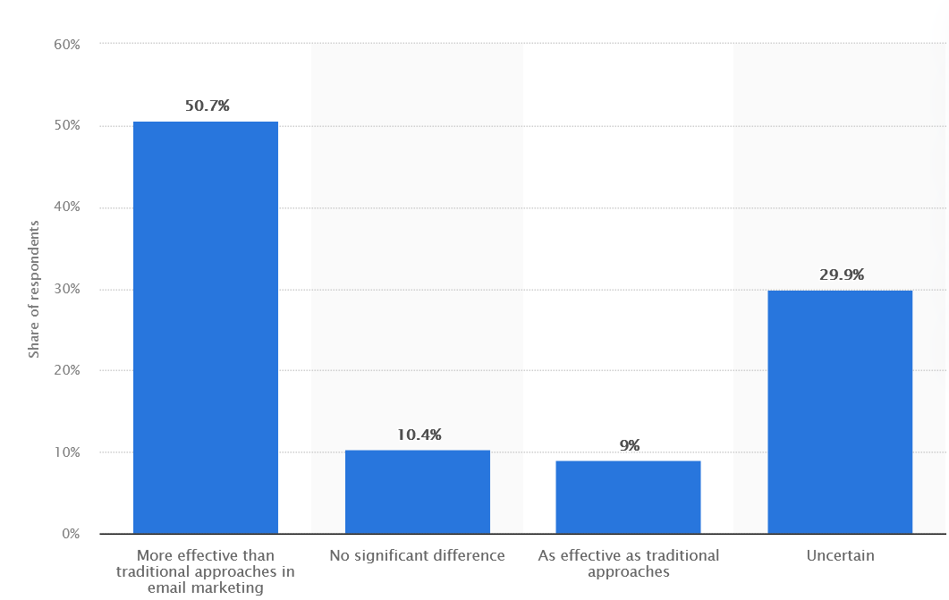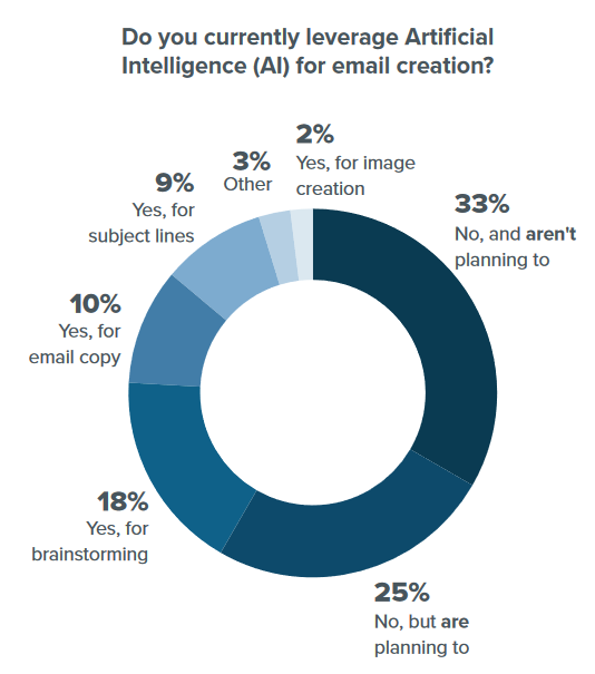- Home
- Fundamentals of Email Marketing
- AI Email Marketing: Updated Ti ...

Since the emergence of AI technologies, it has become strongly embedded in all dimensions of our lives. More and more companies embrace the importance and even inevitability of AI in their operations, be it production, financial sector, or services. Similarly, AI increasingly penetrates email marketing, conquering the industry with its undeniable benefits. At this point, it is not merely a trend but a paradigm shift, where more and more marketers work alongside AI, driven by its benefits. According to the growing amount of data, AI can substantially improve such crucial email marketing aspects as personalization or automation, increasing overall campaign effectiveness.
In this article, we will provide a comprehensive outlook on the role of AI in email marketing and the areas it affects and benefits the most. We will also look into emerging trends and the role they might play in email marketing in the years to come.
Understanding AI in Email Marketing
By now, AI has already deeply grown into email marketing. By analyzing vast amounts of data, AI can predict customer behaviors and do audience segmentation and personalization faster and more efficiently than humans. This analyzed and systemized data provides marketers with an opportunity to target customers more efficiently. This also points to the fact that, at the moment, AI neither replaces marketers nor does it function fully independently. At this point, effective use of AI for email marketing is not about replacement but the co-creation of content that makes the best campaigns.
The Current State of AI in Email Marketing
Less than a year ago, research by Statista revealed that more than half of respondents from the marketing field found the AI approach to be more effective than using only traditional channels. With almost 30% of respondents being uncertain about its effectiveness yet, these findings point out that as AI gets more advanced, the potential number of its adopters can grow as high as an overwhelming 80%.
Effectiveness of artificial intelligence (AI) in email marketing in Europe and the United States as of August 2023

The growing importance of AI-driven email marketing is also underscored by the positive experiences and outcomes reported by marketers who have integrated this technology into their strategies. For example, 95% of marketers utilizing generative AI email marketing tools consider it effective, with over half finding it “very effective.” This high level of effectiveness also translates into significant financial gains. 41% of marketers attribute increased revenue from their email campaigns directly to the use of AI. Furthermore, the practical benefits of AI are evident in the optimization of email subject lines, which have seen open rates boost by 5–10% when crafted by AI. Additionally, 43% of marketers specifically praise generative AI for its utility in crafting emails, indicating that AI’s role is becoming indispensable in designing compelling email content that captures attention and drives engagement.
When it comes to the use purposes of AI, findings from Litmus shed some light on this split. While 33% of marketers still prefer to stay away from AI, the majority are more positive about the trend. Thus, 42% use AI for a variety of purposes, including brainstorming ideas, creating email copies and subject lines, as well as image generation.

Examples from Industry Leaders
Since more and more companies implement AI in their operations, let’s turn toward real-life examples and see how some of the leading companies use AI to advance their email marketing campaigns.
Amazon: Amazon leverages AI to personalize email content for its users based on their browsing history, purchase behavior, and product preferences. By applying Amazon Personalize, provided by Amazon Web Services (AWS), developers can create individualized recommendations for customers. For email marketing, it includes, for example, advancements in personalized product recommendations, custom content delivery, or engagement scoring.
Netflix: Netflix uses AI to send personalized email recommendations based on the viewing history of subscribers. The emails typically feature shows and movies that align with individual user preferences. These AI email campaigns seem to be doing wonders for the company—according to Netflix, 80% of the content viewed on their platform comes from AI-driven personalized recommendations.
eBay: eBay started to heavily invest in AI already in 2016. The company started using the AI email marketing tool Phrasee, which can compose and evaluate thousands of personalized email subject lines for millions of customers incomparably faster than human copywriters would. Since its implementation, eBay has seen a 15.8% average open rate uplift and a 31.2% average click rate uplift in the US alone. Since then, the company has employed other AI tools, such as “magical listing,” which uses AI for product descriptions based on uploaded images.
Sephora decided to utilize Moosend, one of the leading email marketing platforms, and its AI email marketing tools. By employing platforms, AI-driven segmentation, personalization, and automation capabilities, Sephora achieved a truly impressive 240% increase in email open rates and a 5% increase in sales.
Benefits of AI in Email Marketing
Personalization and real-time personalization: AI analyzes how customers interact with previous emails and the company’s website and tailors content specifically to individual needs. For example, AI can categorize customers into detailed segments based on their behaviors and demographics, ensuring that the content they receive fits their age and interest groups. Furthermore, real-time personalization allows for dynamic customization of email content based on ongoing user behavior. For this, if a user browses a particular product category, the next email they receive can include promotions or products from that category.
Efficiency in AI-driven email marketing comes from the automation of routine tasks. AI automates workflows, such as sending emails triggered by specific customer actions like cart abandonment or newsletter sign-up. It also optimizes email scheduling by determining the optimal times for sending emails based on historical open rates. By managing routine tasks, such as automatically updating subscriber details or removing inactive users, AI makes workflow less time-consuming and more efficient.
Optimization: When it comes to email optimization, AI and A/B testing go hand in hand. AI not only automates the process of A/B testing but also analyzes the results to provide clear directives on which strategies work best. With these insights, AI can make real-time adjustments to campaigns, fine-tuning elements like frequency and timing to maximize engagement and effectiveness.
AI-driven automation: Automated emails are triggered based on specific user actions or milestones, such as signing up or making a purchase. AI helps by not only automating the dispatch of these emails but also by personalizing the timing and content based on the recipient’s interaction history. With the support of AI email automation, each customer receives the most relevant information at the most appropriate time without requiring manual oversight.
Predictive analysis: Due to its ability to analyze huge amounts of data, AI becomes indispensable for predicting customers’ future actions. Thorough analyses of the purchased items, unsubscribed actions, or the frequency of email openings create a foundation for predicting the future actions of customers. This allows marketers to craft highly targeted campaigns that cater to the anticipated needs and behaviors of their audience.
Customer journey mapping: AI tools, by analyzing various touchpoints and interactions across different channels, create a comprehensive map of the customer journey. This mapping helps marketers understand common pathways and key decision points in the customer experience. With this insight, marketers can optimize the timing and content of emails to guide potential customers along their journey more effectively.
Anomaly detection: AI email marketing algorithms monitor campaign performance data in real time, quickly spotting deviations from expected patterns—such as sudden drops in open rates or spikes in unsubscribe rates. For instance, if an unusually low open rate is detected, AI can prompt a review of subject lines or send times, allowing marketers to rectify problems before they impact the broader campaign’s effectiveness.
Churn prediction: By analyzing historical data and patterns in customer behavior, AI models can identify early warning signs of dissatisfaction or disengagement that might lead to churn. For example, changes in purchasing behavior could signal a risk of churn. Armed with this predictive insight, marketers can craft personalized retention strategies or special offers aimed at re-engaging these at-risk customers.
Sentiment analysis is related to valuable insights into how customers feel about a brand or its products based on their responses to emails. AI-powered tools analyze the text in email responses, categorizing sentiments as positive, negative, or neutral. This analysis helps marketers gauge the overall customer sentiment and identify areas needing improvement or aspects that are well-received. Understanding sentiment at this level allows for more nuanced customer interactions and helps tailor future communications to better meet customer expectations.
Dynamic content: The appearance of AI unlocked almost unlimited possibilities for the creation of not only personalized but also interactive and adaptable content. This can include, for example, a countdown timer for a sale ending, Interactive maps or images that the customer can click, or a custom coupon code for a first-time purchase. With the appearance of AI in email marketing, options become almost limitless. This level of dynamism makes emails feel more engaging and personal, which is appreciated by users the most.
AI Tools for Email Marketing
The importance of email marketing as one of the most efficient tools for customer acquisition and retention by businesses has created a growing demand for platforms that help millions of companies optimize their efforts in this field.
Today, the market for email marketing platforms is quite diverse and includes some of the oldest players, like MailChimp and Constant Contact, as well as newer ones, like EmailOctopus or Mailmodo. Some platforms provide more complex email marketing solutions, like Klaviyo or Moosend, aiming for simplicity. Regardless of time on the market or target audience, every contemporary email marketing platform incorporates AI tools into their core functionality, providing clients with advanced email list management, content personalization and segmentation, automation of campaigns, and design options.
Practical Steps to Integrate AI into Your Email Marketing Campaigns
Content ideation
AI assists in brainstorming and generating email content ideas, while tools with AI capabilities can suggest topics that resonate with your audience or help generate catchy headlines that increase open rates.
Email validation
AI can support you in identifying and correcting errors in email addresses, analyzing which emails are most likely to bounce, and cleaning up lists by removing these addresses. This ensures higher delivery rates and better compliance with spam regulations.
Sending frequency
AI recognizes patterns across different user segments and adapts the sending schedule to match user preferences and behaviors.
Campaign insights
AI can track open rates, click-through rates, conversion rates, and more, providing insights not just into what is working but also why certain strategies are effective for certain email campaigns.
Content creation
AI suggests personalization elements, predictive text, and even entire email templates based on the audience’s past behavior and preferences. Some AI email marketing tools can create diverse content variants, which can be A/B tested to determine which resonates best with the audience.
Email list cleanup
By periodically scanning the email list, AI can identify inactive or unresponsive subscribers. It suggests when it might be beneficial to re-engage these subscribers with a different approach or remove them from the list to improve overall campaign metrics and deliverability.
Email personalization
AI can drastically improve email personalization by utilizing data points like past purchases, browsing behavior, and user demographics, making each email more tailored to fit the interests and preferences of each subscriber.
Smart segmentation
AI models can detect subtle patterns and preferences, allowing for the creation of finely tuned segments based on predicted behaviors or preferences, leading to more effective and targeted campaigns.
Email automation
AI email automation continuously optimizes automated workflows by learning which sequences of emails perform best for different types of users and adjusting the workflow accordingly.
AI in Future Email Campaigns
Current estimates suggest that around 347.3 billion emails are exchanged globally each day, a number projected to rise to 392.5 billion by 2025. In this context, AI email marketing capabilities are becoming increasingly important. As AI-generated content becomes more sophisticated on the one hand and more accessible on the other, the potential for AI to revolutionize email marketing grows exponentially.
That being said, it does not mean that AI will fully replace human marketers anytime soon. What it will, nonetheless, do is reshape their skills. Mastering AI-based marketing tools will become a crucial skill, as will the ability to interpret complex data trends and translate them into effective, actionable marketing strategies. Understanding the basics of machine learning will also become more important, equipping marketers to make the most of AI’s evolving capabilities. Marketers are thus faced with a new environment where they need to learn the new skill of content co-creation.
As AI integration deepens, marketers will need to not only leverage its power to create more efficient campaigns but also navigate the increasingly complex landscape of data privacy. With the General Data Protection Regulation (GDPR) in Europe, other regions are following suit. Canada’s CASL and forthcoming changes in the United States signal a global shift towards stricter privacy controls in email marketing.
To Sum Up
A collective overview of the email marketing industry presented in this article illustrates a clear trend: AI is not only enhancing the creative aspects of email marketing but is also a critical tool for driving better business outcomes.
With their abilities to significantly improve such crucial contemporary user email aspects as personalization, automation, and segmentation, AI tools will continue to be exploited by companies for the creation of more efficient email campaigns. What’s for users—they benefit as well by getting in their inboxes not spam-like generic emails but offers that have an actual value. As long as data privacy laws are complied with, AI will continue coupling companies and clients via mailboxes in increasingly efficient ways.



